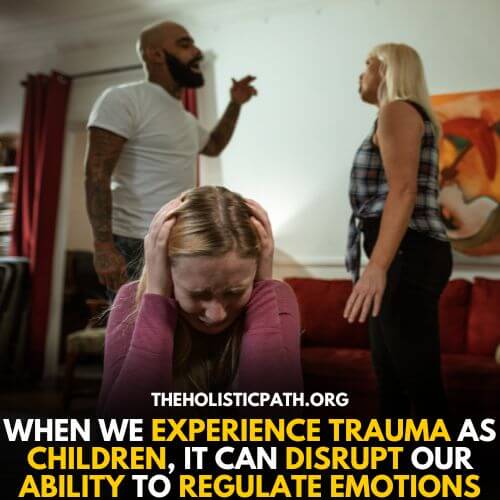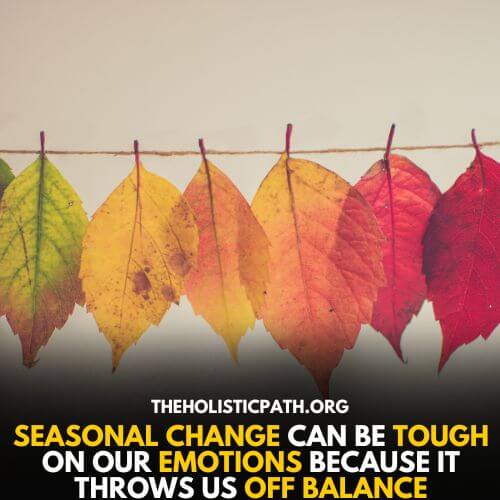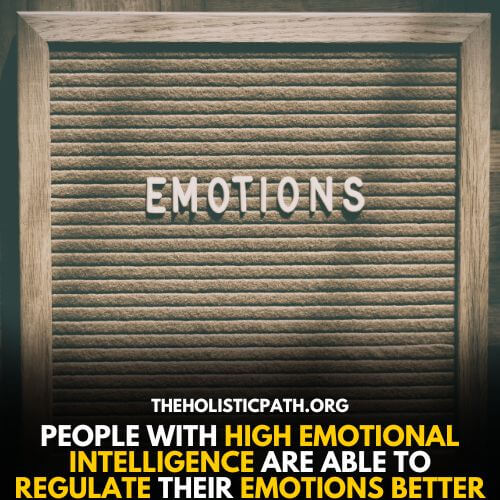Why is it that some people never seem to get emotional, while others always seem to be on the verge of tears? Why I am so emotional?
Have you often found yourself questioning this? Then you are not alone. There are a lot of people who have the same question as well.
After all, emotions can be overwhelming. They can come out of nowhere, and they can make us feel incredibly vulnerable.
But are emotions all that bad? No emotions can also be incredibly beautiful and intense. They remind us of what it means to be alive.
Let’s explore what might be your reason for feeling emotional and what you can do about it. So that you can enjoy a life full of emotions without getting too overwhelmed.
Why Do People Feel Emotional In The First Place?
Emotions are our mental and physical responses to the events happening around us. They help us make decisions, communicate our needs, and connect with others.
There are four main emotions that people feel on a daily basis: happiness, sadness, anger, and fear. But there are also a wide range of other emotions that we experience, such as love, guilt, pride, anxiety, and jealousy.
So why do people feel emotions in the first place? The answer is that emotions are evolutionary adaptations that have helped our ancestors to survive and thrive. Emotions help us to quickly assess situations and make decisions that could mean the difference between life and death.
They also help us to build social bonds and to form attachments with others. In short, emotions are essential for our survival and well-being.
But when we feel too much of any one emotion, it can become overwhelming and lead to problems in our lives. That’s why it’s important to understand our emotions and learn how to manage them in healthy ways.
What Are Some Of The Causes Of Emotional Outbursts
1. Poor Sleep
Have you ever been so tired that you felt like you were about to cry? If so, you’re not alone. Lack of sleep can have a major impact on our emotions. When we’re tired, we’re more likely to feel irritable, stressed, and sad.
We may also find it harder to concentrate and make decisions. All of these factors can lead to outbursts of emotion. In extreme cases, sleep deprivation can even trigger hallucinations and delusions.
So if you’re feeling a bit weepy, it might be time to call it a night.
2. Difficult Life Events
There are a number of reasons why you might become too emotional when dealing with difficult life situations. For one, you may be overwhelmed by the situation and unable to cope in a healthy way.
Additionally, if you are not used to handling stress or adversity, you may crumble under the pressure. Finally, some people simply have a more emotional personality and tend to overreact to even small challenges. While this may not be ideal, it is perfectly normal.
In fact, it is often when we are faced with difficult obstacles that we grow the most as individuals. So, if you find yourself becoming too emotional when dealing with tough times, don’t be too hard on yourself.
3. Unresolved Childhood Trauma
Why am I always so emotional? Why can’t I just let things go? Why do I have to cry at every little thing? Why does everything bother me so much?

If you’ve ever asked yourself any of these questions, you may be struggling with unresolved childhood trauma. When we experience trauma as children, it can disrupt our ability to regulate our emotions.
This can lead to a feeling of being “stuck” in a perpetual state of emotional intensity. We might find ourselves crying more easily, feeling angry more often, or having difficulty calming down after experiencing strong emotions.
There are many reasons why childhood trauma can go unresolved. Maybe we weren’t able to process what happened at the time. Maybe we were told to keep it a secret. Maybe we were made to feel like we were responsible for what happened.
Whatever the reason, living with unresolved trauma can be extremely difficult. However, there is hope. With the help of a therapist or other mental health professional, it is possible to begin working through the trauma and start to heal.
4. Mental Health Issues
There are a variety of mental health issues that can make someone too emotional. For example, anxiety can cause a person to be excessively worried or fearful, which can lead to increased emotions and agitation.
Depression can also cause a person to feel hopeless and helpless, leading to low energy and motivation, as well as increased emotions.
Additionally, bipolar disorder can cause radical swings in mood, which can lead to heightened emotions during manic episodes.
While mental health issues can differ in their symptoms, they all have the potential to make someone too emotional.
5. Why I am So emotional-Medications
One of the common side effects of many medications is increased emotionality. For some people, this can manifest as feeling more anxious or irritable than usual.
For others, it may cause them to feel more emotionally sensitive and may lead to crying more easily. In severe cases, medication-induced emotionalism can even result in a loss of impulse control, leading to outbursts of anger or rage.
There are many possible explanations for why medication can have this effect. One theory is that medications can interact with neurotransmitters in the brain, altering levels of these chemicals and resulting in changes in mood or behavior.
Another possibility is that medications can increase activity in the limbic system, which is responsible for processing emotions. Whatever the mechanism, it is clear that medication can sometimes have a profound impact on emotions.
6. Hormonal Changes
Let’s be real, we’ve all been there before. You’re minding your own business and then all of the sudden you find yourself getting really emotional for no reason. Chances are, it’s not because you’re psycho but because of hormone changes. Here are some examples of why you may be feeling extra emotional.
One common reason is during pregnancy. Pregnancy hormones can cause all kinds of emotions, from happiness and elation to anger and sadness. It’s often said that pregnant women are moody and while that may not be true all the time, it is true that pregnancy hormones can cause big mood swings.
Another common time for hormonal changes is during puberty. It’s no secret that teenagers can be moody and emotional and that’s because their bodies are going through a lot of changes. Puberty is actually a pretty difficult time for a lot of people, both physically and emotionally.

There are also some medical conditions that can cause hormonal changes which in turn make someone more emotional. For example, both PMS and menopause can cause hormonal changes which lead to increased emotions.
PMS (Premenstrual Syndrome) is something that most women experience on a monthly basis and it can include symptoms such as irritability, bloating, fatigue, and cramps- just to name a few. Menopause is when a woman stops having her period and it occurs later on in life.
During menopause, many women experience hot flashes, night sweats, vaginal dryness, and mood swings. As you can see, both PMS and menopause can have similar symptoms which can make someone very emotional.
All in all, there are many reasons why you may be feeling extra emotional and it’s usually due to hormonal changes. Next time you find yourself tearing up for no reason or suddenly snapping at your best friend, remember it may not be entirely your fault.
7. Food Sensitivities
When someone is constantly on edge, it can be tough to manage day-to-day life. For someone, part of ‘why I am emotional’ may be because of food sensitivities. What may not realize is that the foods we eat can have an effect on our mood.
And when you’re sensitive to certain foods, they can cause all sorts of problems – from digestive issues to skin problems to, you guessed it, feeling emotionally unstable. So, if you’re wondering why you’re always feeling so down, it might be time to take a closer look at your diet.
You might be surprised at how much of a difference it can make.
8. Abusive Relationship
Being in an abusive relationship can really take a toll on someone emotionally. After being constantly put down, manipulated, and controlled, it’s no wonder why someone would be an emotional wreck.
It’s not uncommon for someone in an abusive relationship to feel like they’re not good enough, that they’re worthless, and that they’ll never be able to find anyone better. This can lead to a person feeling depressed, anxious, and even suicidal.
Additionally, being in an abusive relationship can make it difficult to trust people, as well as make it hard to have healthy relationships in the future. If you’re in an abusive relationship, it’s important to seek help from a friend or family member, or even a professional.
Getting out of the toxic environment is essential for your emotional well-being.
9. Not Being Heard Or Supported
We’ve all had that feeling before. You know the one – when you’re out with your friends or family, and you’re just not being heard. Maybe you have a different opinion on the movie everyone wants to see, or perhaps you’re trying to make a point about politics, but no one seems to be listening.
It can be frustrating, and over time, it can start to take its toll. After a while, you might start to feel like your opinions don’t matter, and that can lead to feeling overwhelmed and emotional.
After all, why bother speaking up if no one is going to listen? If you find yourself in this situation often, it might be time to take a step back and reassess your relationships.
Surround yourself with people who will listen to you and support you, and you’ll start to feel better in no time.
10. Environment-Seasonal Change
Environment-Seasonal Change can make someone too emotional for a variety of reasons. For example, if someone is used to the warm weather and then it suddenly turns cold, they may feel more sluggish and down.

Or, if someone is used to the cold weather and then it suddenly turns warm, they may feel more anxious and stressed.
Furthermore, if someone’s routine is disrupted by a change in the season (e.g., they have to start wearing different clothes, have to start using different transportation), this can also lead to feelings of frustration and irritability.
Ultimately, seasonal change can be tough on our emotions because it throws us off balance and makes us feel like we’re not in control.
11. Highly Sensitive
Being highly sensitive can make someone too emotional for a few different reasons. One reason is that highly sensitive people often have a more intense reaction to things than others.
This can be due to the fact that they are processing information on a deeper level, and as a result, they may feel things more deeply.
Another reason why highly sensitive people may be too emotional is that they may be more easily overwhelmed by stimuli. This can lead to feelings of anxiety or overwhelm, which can then lead to emotions such as sadness or anger.
Finally, highly sensitive people may also be more attuned to the emotions of others. This means that they may pick up on the subtle cues that others are giving off, and as a result, they may feel the emotions of others as well.
While being highly sensitive has its challenges, it also allows for a greater depth of experience and connection with the world around us.
12. Experienced Traumas
Trauma is defined as a deeply distressing or disturbing experience. When someone experiences trauma, it can have a lasting effect on their mental and emotional well-being.
For example, they may often feel on edge, startle easily, or have difficulty sleeping. They may also find it hard to trust people, feel depressed or anxious, and have overwhelming emotions.
While it is normal to feel these things after a traumatic event, for some people, the symptoms can be so severe that they interfere with daily life. In extreme cases, someone may be diagnosed with post-traumatic stress disorder (PTSD).
PTSD is a serious condition that requires treatment. If you are experiencing any of the above symptoms, it is important to seek help from a mental health professional.
13. Gaslighting
There are many reasons why someone might be too emotional. One possibility is that they are gaslighting themselves. Gaslighting is a form of psychological manipulation in which a person attempts to make another person doubt their own memories or perceptions.
This can be done by denying facts, making false statements, or constantly changing the subject. Over time, this can lead to the gaslightee feeling confused, anxious, and even paranoid.
As a result, they may become overly emotional as they try to make sense of the situation. If you suspect that you are being gaslighted, it is important to reach out for help from a trusted friend or professional.
14. Burnout
When we think of burnout, we often think of it in terms of physical or mental exhaustion. But burnout can also make us too emotional. We may find ourselves feeling more irritable, more easily angered, or more prone to tears.
We may also have a hard time focusing on anything other than our emotional reactions. The emotional symptoms of burnout can be just as troubling as the physical ones, and they can often make it difficult to cope with the demands of daily life.
If you’re struggling with emotional burnout, it’s important to reach out for help. Talk to your doctor or a therapist who can help you manage your symptoms and start to feel better.
15. Lifestyle
We’ve all been there before – we get upset about something minor and it ends up snowballing into a full-blown emotional meltdown. It’s frustrating, but it’s also pretty common. There are a lot of factors that can contribute to emotional instability, but one of the most important is a lifestyle.
If you’re not taking care of yourself, it’s not surprising that you’ll end up feeling overwhelmed and emotional. Here are some examples of how lifestyle can make someone too emotional:
- Not exercising: Exercise releases endorphins, which have mood-boosting effects. If you’re not moving your body, you’re more likely to feel down and emotional.
- Isolating yourself: We are social creatures by nature and we need human connection to thrive. If you’re not spending time with others, it can lead to feelings of loneliness and depression – both of which can make someone overly emotional.

These are just a few examples of how lifestyle can affect emotions. If you want to avoid becoming too emotional, it’s important to take care of yourself both physically and mentally.
16. Why I Am So Emotional-Diet
There’s no doubt that what we eat has an effect on how we feel. For example, have you ever noticed that you tend to feel tired after eating a big meal? Or that you get a second wind after having a cup of coffee? Certain foods can definitely have an impact on our emotional state.
For instance, eating something sugary can give us a temporary boost of energy, while consuming alcohol can make us feel relaxed and happy.
On the other hand, diet can also affect our emotions in a more long-term way. For example, if we’re not getting enough of certain nutrients, we may end up feeling irritable or even depressed.
Similarly, if we overeat or eat too much junk food, we may end up feeling sluggish and low on energy. In extreme cases, an unhealthy diet can even lead to serious mental health problems. So it’s definitely important to be mindful of what we eat and how it makes us feel.
17. Stress
When we get stressed, it can feel like everything is getting on top of us. We might find things that normally wouldn’t bother us suddenly getting on our nerves, or reacting to things in ways that seem out of character. This is because stress can make us more emotional.
When we’re stressed, our bodies release a hormone called cortisol. Cortisol is sometimes called the ‘stress hormone’ because it’s responsible for the ‘fight or flight’ response. This is the body’s way of preparing us to deal with a threat by making sure we have plenty of energy and are alert and ready to act.
In the short term, this response can be helpful, but if we’re constantly under stress, cortisol levels can stay high, and this can have an impact on our emotional state.
Too much cortisol can make us feel irritable and anxious, and it can also affect our memory and concentration. We might find ourselves snapping at people more easily or becoming more tearful.
If you’re struggling to cope with stress and feeling emotional more often than usual, it’s important to talk to someone about it. Talking to a friend or family member can help you to offload some of your feelings and start to feel better, and there are also professional services available if you need more support.
18. Grief-Loss Of Loved One
Grief is a very emotional process, and it can often make people too emotional to function normally. This is because grief is a reaction to a loss, and the loss of a loved one can be one of the most devastating experiences a person can go through.
When someone is grieving, they are often overwhelmed by sadness, anger, and guilt. These emotions can make it difficult for them to think clearly or make decisions. As a result, grief can often lead to emotional outbursts and irrational behavior.
While grief is a natural and necessary process, it can sometimes be too much for people to handle on their own. If you find yourself feeling overwhelmed by grief, it may be helpful to talk to a counselor or therapist who can help you through this difficult time.
19. Bottling Up The Emotions
It’s pretty common knowledge that bottling up your emotions is a bad idea. When you keep everything inside, it can eventually make you explode. But what people don’t always realize is that bottling up your emotions can also make you too emotional.
For example, say you’re really mad at your boss but you don’t want to say anything because you don’t want to get fired. So instead, you just internalize all of that anger and it builds up until you’re seething with rage. Or maybe you’ve been dumped by your partner and you insist on putting on a brave face for everyone even though you’re dying inside.
Eventually, all of that pain and grief is going to come bubbling to the surface in an emotional outburst. So next time you’re feeling down, try to let it out instead of bottling it up. It might just save you from an emotional breakdown later on.
20. Stuck In A Dead-End Job
A dead-end job can be absolutely draining, both mentally and emotionally. First of all, you’re likely not being challenged in any way, which can make work feel incredibly repetitive and boring.
On top of that, you might feel like you’re being taken advantage of or that your skills are going to waste. And if you’re not being paid what you’re worth, it can be tough to make ends meet.

All of this can lead to a feeling of hopelessness and despair, which can manifest itself in emotional outbursts at work or at home. If you find yourself in this situation, it’s important to take some time for yourself – even if it’s just a few minutes each day – to do something that makes you happy.
This can help alleviate some of the built-up emotional tension and give you the strength to keep going.
21. People-Pleaser
One of the biggest problems with being a people-pleaser is that it can make you too emotional. You are constantly worrying about what other people think of you and whether or not they approve of you.
This can lead to a lot of anxiety and stress, which can then cause you to become emotional. You may find yourself getting upset over things that don’t seem like a big deal, or you may have difficulty controlling your emotions in general.
This can be a real problem in your life, as it can make you seem unstable and unreliable. Additionally, it can also make it difficult for you to form healthy relationships, as people may not want to deal with someone who is so emotional all the time.
If you find that being a people-pleaser is making you too emotional, it’s important to try to change your mindset. Focus on pleasing yourself first and foremost, and don’t worry so much about what other people think.
This can be a difficult thing to do, but it’s important to remember that you are the only one who can control your emotions. As long as you are happy with yourself, that’s all that matters.
22. Major Life Change
Everyone copes with change differently. Some people take it in stride and adjust easily, while others struggle to deal with even the smallest alteration to their routine.
Major life changes, such as starting a new job, getting married, or becoming a parent, can be especially overwhelming. When faced with a significant transition, it’s common to feel emotional.
After all, change can be scary. You might worry about the future or miss the comforts of the past. If you’re feeling emotional after a major life change, that’s perfectly normal.
Here are a few examples of how major life changes can cause someone to become too emotional:
- Starting a new job: When you start a new job, you’re thrust into an unfamiliar environment with new people and new expectations. It’s natural to feel out of your element and emotional during this time of adjustment.
- Getting married: Wedding planning can be stressful, and the big day itself can be an emotional roller coaster. From saying “I do” to dancing with your spouse for the first time as husband and wife, there are plenty of reasons to get emotional on your wedding day.
- Becoming a parent: Whether you’re expecting your first child or adding to your family, becoming a parent is a huge responsibility. It’s not uncommon to feel scared or uncertain about your ability to care for a child. These emotions are normal and natural – after all, parenthood is a major life change!
How Can We Manage Our Emotions Better
We all have emotions – it’s a natural and essential part of being human. However, sometimes our emotions can get the better of us, leading us to act in ways that we later regret. So how can we manage our emotions better?
1. Expressing Your Emotions
At some point or another, we’ve all been told to “just stop being so emotional.” But what if expressing our emotions is actually the key to managing them better? When we bottle up our feelings, they can fester and become more difficult to control.
But when we express ourselves, we can release those emotions and gain a better understanding of why we’re feeling them in the first place. Whether it’s through writing, talking to a friend, or simply crying it out, giving voice to our emotions can help us to manage them in a more healthy and effective way.
So next time you’re feeling overwhelmed, try expressing yourself instead of bottling everything up. It just might help you to feel better.
2. Learn To Deal With Difficult Emotions
Emotions are a normal and important part of our lives. They color our perceptions, shape our thoughts, and influence our behavior. But when they become too intense, too frequent, or last too long, they can interfere with our daily lives. The good news is that there are effective ways to deal with difficult emotions. Here are a few suggestions:
- Identify the feeling. The first step is to become aware of what you’re feeling. This may seem obvious, but it can be easy to get caught up in the experience of the emotion and lose track of what’s really going on. Pay attention to your body as well as your mental state. What physical sensations do you notice? What’s happening in your mind?
- Understand why you’re feeling this way. Once you’ve identified the feeling, try to understand what might be causing it. What happened just before you started feeling this way? Are there any events or situations that trigger these emotions?
- Accept the feeling. It’s important to remember that all feelings are valid and deserve to be respected. Whether they’re positive or negative, they’re a part of who you are. Trying to push away or ignore difficult emotions will only make them stronger in the long run.
- Express yourself. Once you’ve accepted the feeling, it’s time to let it out in a healthy way. Talk to a trusted friend or family member about what you’re going through. Write down your thoughts and feelings in a journal. If you’re angry, try hitting a pillow or going for a run. If you’re sad, allow yourself to cry.
- Make an effort to improve your mood. This doesn’t mean that you have to force yourself to feel happy all the time—that’s not realistic or sustainable. But there are things you can do to help yourself feel better in general: eat healthy meals, get regular exercise, get enough sleep, and spend time with people who make you feel good about yourself.
Taking steps to deal with difficult emotions can be challenging, but it’s worth the effort. When you manage your emotions effectively, you’ll feel better overall and be better equipped to handle whatever life throws your way.
3. Know When You Are Struggling With Emotions
If you’re feeling overwhelmed by your emotions, it’s important to take a step back and understand why you’re feeling that way. Are you stressed out because of a problem at work or school? Are you grieving the loss of a loved one? Once you know why you’re feeling emotional, you can take steps to address the problem.
If you’re feeling stressed, for example, you might try relaxation techniques like deep breathing or yoga. If you’re grieving, you might find comfort in talking to friends or attending a support group. Remember, it’s okay to ask for help if you’re struggling to cope with your emotions. There are plenty of people who are ready and willing to lend a hand.
4. Increase Your Emotional Intelligence
It’s well-known that emotional intelligence can help with things like stress management and building stronger relationships. But what about managing your own emotions? Turns out, emotional intelligence can be a big help there too.
People with high emotional intelligence are able to regulate their emotions better. They’re not as easily defensive and react less emotionally to things. Instead, they’re more likely to take a step back, assess the situation, and respond in a more measured way.

This doesn’t mean that people with high emotional intelligence don’t feel things just as deeply as everyone else. They still experience all the same emotions. But they’re better able to control them and not let them take over.
So if you find yourself getting easily defensive or acting impulsively when something bothers you, working on your emotional intelligence might be a good idea. It could help you become less emotional and react in a more positive way.
5. Become Mindful
Mindfulness can help us to manage our emotions more effectively. By paying attention to our thoughts and feelings in the present moment, we can learn to respond to them in more constructive ways. We can also develop a greater understanding of our emotions and how they affect us.
This can lead to deeper insight and greater self-awareness, which are both key components of emotional intelligence. As we become more mindful of our emotions, we become better able to manage them and make decisions that are in line with our values and goals.
In this way, mindfulness helps us to live more authentic and fulfilling lives.
Conclusion
It’s perfectly normal to feel emotional from time to time. In fact, it’s a healthy way to process your thoughts and experiences. However, if you find that you’re constantly feeling overwhelmed by your emotions, it might be worth seeking out some help.
So next time you’re feeling emotional, don’t be afraid to let it out. Cry if you need to, laugh when something tickles your funny bone, and feel joy when something wonderful happens. It’s all a part of life – and it’s what makes it worth living.
